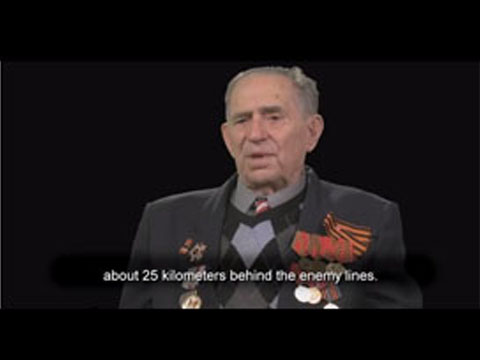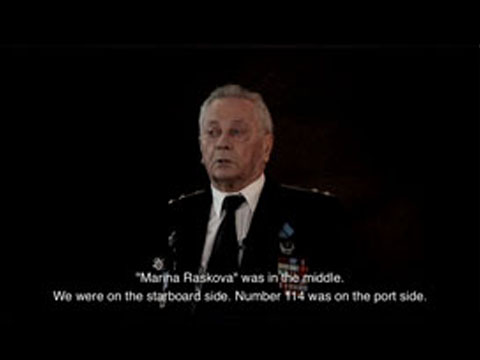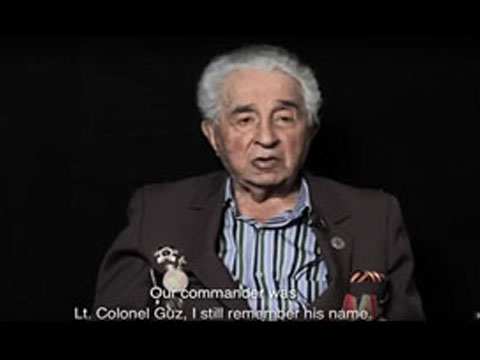
Alexei Litvachuk
Born 1921 Vinnitsa, Ukraine.
Interviewed In: Toronto, Ontario
Medals Awarded: Order of the Patriotic War (1st and 2nd Class), Medal For Defense of Moscow and Victory over Germany In The Great Patriotic War
“They were sent from the command centre to my look-out point to find out why I stopped sending information…and apparently I stopped talking due to a direct hit”
Radio and Artillery Operator, Orsha, Vitebsk, Lithuania
After being drafted Lev was offered the chance to enroll in officers training but chose to be sent to the front. He finished training at a radio operator school in Sartov and was sent to the front lines near Voronezh. “I was assigned to a post at a look-out station. Meaning I was to do the spotting for the guns – reporting to the command centre about the enemy fire and location. 2 riflemen were attached as my assistants. However, due to the shortage of men, only one rifleman was at my disposal. During the dark time of the day we entrenched ourselves at a distance determined by the instruction. After that we started watching over the enemy. The enemy was stationed on the west bank of the river Voronezhka, a little south of Voronezh city, as far as I remember. There wasn’t anyone in front of us. The anti-tank gunners were removed after our guns were set up. There were no infantry, no one, just an open field with enemy tanks across the river. There started a random firing. And so I stayed as a look-out radio operator for about 2 months”. Lev was injured by an enemy shell while fighting near Voronezh. “A shell, I don’t even know what kind of a shell it was, an artillery or a mortar one, hit right into the dug-out of my assistant rifleman. And that was the condition… I was contused and lost my consciousness. That was what my comrades told me later; they were sent from the command centre to my look-out point to find out why I stopped sending information. They saw in their field glasses that the shells were hitting right and left meaning there was an orientation zero-in firing going on. And apparently I stopped talking due to a direct hit. And that’s how they found me lying there unconscious with a radio telephone handset in
my hand. A transmitter, a radio transmitter, was on the breastwork completely smashed. They thought it had saved my life. However I don’t think so. I think I was just shaken with a wave, a blast wave; the shell hit the rifleman’s dug-out. The rifleman was torn to bits. To this day I have great pity, he was a very smart guy.”
Lev was rescued and placed on a medical train. He spent three months recuperating and began a radio training program while unable to return to combat. Radio operators were needed so Lev was sent back to the front as soon as he recovered, before officially completing his training. Lev arrived at the appointed location only to learn his new unit left ahead of schedule. He was able to join them on the way to Orsha and was with them for battles near Vitebsk and along The Moscow-Minks Highway.
“We walked around the Vitebsk fortified area, walked from the boggy area in the enemy’s rear line. Not until Vitebsk was conquered were we able to move from the flank, even from the enemy rear lines, the fortified area of Orsha section of the front. Only when the Germans started evacuation we were able to move forward to Orsha. We liberated Orsha and went on along Moscow-Warsaw highway, rather Minsk-Warsaw”.
Lev finished the war fighting in Lithuania. He was the only male attached to an all female artillery unit.
“And so when one of the radio operators left the ranks, posted from the unit, our battery commander offered “You know we need someone to come to artillery men to help”. “Will you go to the artillery crew, the gun platoon?” I go “If there is need in me, I will”. And so I was assigned to be an artillery crew member, a spotter. My task was like this. There was this antiaircraft artillery fire control device. I was to send via cables information picked up from a moving object. An object moving in the air, an enemy aircraft. My task was to read the distance and to spot the aircraft and perform adjustments to determine a type of a detonating fuse for a missile to hit the target. The spotter’s mission was very important. We had a special table showing for instance, that the altitude is 15 km… rather 15,000 meters. 15 km… I had to make adjustments taking into account the speed… for instance 4 to 12 km, that’s just an example. I was the only man there. Some of the women commanders made it clear that I was kind of in the way. “It was OK while he was a boy. When he’s in the toilet everyone has to wait for him to leave”. Anti-aircraft artillery command platoon was all women too, approximately 38 women in the platoon”.
Lev became a specialist in applied medicine after the war. He and his wife immigrated to Canada in 1994. They live in Vancouver near their children and grandchildren.

Born 1921 Vinnitsa, Ukraine.
Interviewed In: Toronto, Ontario
Medals Awarded: Order of the Patriotic War (1st and 2nd Class), Medal For Defense of Moscow and Victory over Germany In The Great Patriotic War

Born August 28, 1924 Odessa, Ukraine
Interviewed In: Vancouver, British Columbia
Medals Awarded: Order of the Patriotic War (1st and 2nd Class), Order of the Red Star, Victory over Germany In The Great Patriotic War and Nakhimov Medal

May 20, 1923 Kiev
Interviewed In: Toronto, Ontario